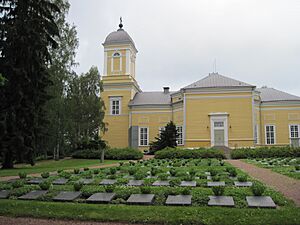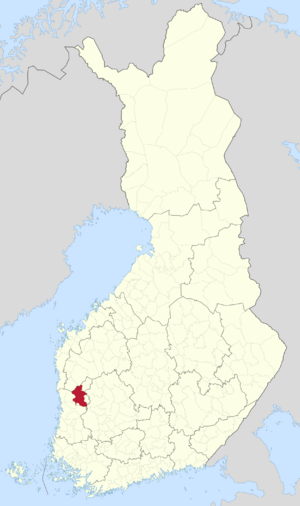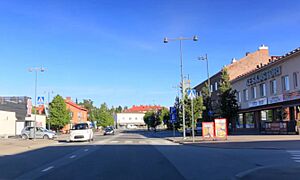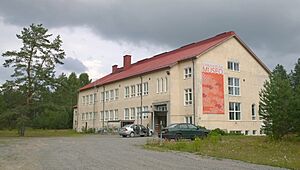Kankaanpää facts for kids
Quick facts for kids
Kankaanpää
|
||
|---|---|---|
|
Town
|
||
| Kankaanpään kaupunki Kankaanpää stad |
||

Military cemetery at church in Kankaanpää
|
||
|
||

Location of Kankaanpää in Finland
|
||
| Country | ||
| Region | Satakunta | |
| Sub-region | Northern Satakunta sub-region | |
| Charter | 1865 | |
| Market town | 1967 | |
| Town privileges | 1972 | |
| Area
(2018-01-01)
|
||
| • Total | 704.73 km2 (272.10 sq mi) | |
| • Land | 1,021.25 km2 (394.31 sq mi) | |
| • Water | 15.37 km2 (5.93 sq mi) | |
| Area rank | 122nd largest in Finland | |
| Population
(2023-12-31)
|
||
| • Total | 12,394 | |
| • Rank | 82nd largest in Finland | |
| • Density | 12.14/km2 (31.4/sq mi) | |
| Population by native language | ||
| • Finnish | 94.8% (official) | |
| • Swedish | 0.1% | |
| • Others | 5.1% | |
| Population by age | ||
| • 0 to 14 | 14.5% | |
| • 15 to 64 | 57.4% | |
| • 65 or older | 28.2% | |
| Time zone | UTC+02:00 (EET) | |
| • Summer (DST) | UTC+03:00 (EEST) | |
| Climate | Dfc | |
| Website | www.kankaanpaa.fi | |
Kankaanpää is a town and municipality in Finland. It was founded in 1865. It became a township in 1967 and a full town in 1972. Kankaanpää is located where the Hämeenkangas and Pohjankangas ridges meet. It is part of the Satakunta region.
Kankaanpää has about 12,400 people living there. This makes it the third largest municipality in the Satakunta region by population. Only the cities of Pori and Rauma are larger. Pori is about 53 kilometers (33 miles) southwest of Kankaanpää.
The coat of arms of Kankaanpää shows a golden pine tree. This design represents the town's early history and its location in forest areas. Carolus Lindberg designed the coat of arms, and it was officially approved on October 12, 1951.
The municipality of Honkajoki joined with Kankaanpää on January 1, 2021.
Contents
Discovering Kankaanpää's Past
The first signs of people living in the Kankaanpää area date back to the Stone Age. By the 1500s, people began to settle here more permanently. The oldest houses mentioned in documents from Swedish Finland are from the 1560s. Back then, there were three main houses: Honko, Oukari, and Päivike.
Important Roads and Royal Visits
In the 17th century, an important road passed through Kankaanpää. This road connected Hämeenkyrö in southern Finland to Kauhajoki in Ostrobothnia. It was the main route between these two parts of the country.
Two Swedish kings visited Kankaanpää. Gustavus Adolphus traveled through in 1614 on his way from Ilmajoki to Hämeenlinna. Later, in 1752, Adolf Fredrik stopped at a spring called Kuninkaanlähde. He watered his horses and ate there. The spring was named "Kuninkaanlähde" (King's Spring) after his visit.
The Town's Church
The church in Kankaanpää was built in 1839. The famous architect C. L. Engel designed it.
Understanding Kankaanpää's Climate
Kankaanpää has a Subarctic climate. This means it has long, cold winters and short, cool summers. The nearby village of Niinisalo helps us understand Kankaanpää's weather.
Kankaanpää is known as one of the rainiest places in Finland. In 1995, it received 571 millimeters (about 22.5 inches) of rain during the growing season alone. The growing season, when plants can grow, usually starts in early May and lasts until October 10.
| Climate data for Kankaanpää (Niinisalo), elevation: 136 m or 446 ft, 1961-1990 normals and extremes | |||||||||||||
|---|---|---|---|---|---|---|---|---|---|---|---|---|---|
| Month | Jan | Feb | Mar | Apr | May | Jun | Jul | Aug | Sep | Oct | Nov | Dec | Year |
| Record high °C (°F) | 7.0 (44.6) |
8.5 (47.3) |
13.5 (56.3) |
21.2 (70.2) |
28.4 (83.1) |
32.5 (90.5) |
30.4 (86.7) |
31.2 (88.2) |
27.7 (81.9) |
16.3 (61.3) |
10.2 (50.4) |
7.0 (44.6) |
32.5 (90.5) |
| Mean daily maximum °C (°F) | −5.1 (22.8) |
−4.6 (23.7) |
0.2 (32.4) |
6.3 (43.3) |
14.7 (58.5) |
19.7 (67.5) |
21.1 (70.0) |
18.8 (65.8) |
12.8 (55.0) |
7.0 (44.6) |
1.0 (33.8) |
−2.9 (26.8) |
7.4 (45.3) |
| Daily mean °C (°F) | −8.0 (17.6) |
−7.8 (18.0) |
−3.7 (25.3) |
1.9 (35.4) |
9.0 (48.2) |
14.0 (57.2) |
15.7 (60.3) |
13.8 (56.8) |
8.8 (47.8) |
4.0 (39.2) |
−1.3 (29.7) |
−5.6 (21.9) |
3.4 (38.1) |
| Mean daily minimum °C (°F) | −11.3 (11.7) |
−11.1 (12.0) |
−7.4 (18.7) |
−2.2 (28.0) |
3.4 (38.1) |
8.2 (46.8) |
10.5 (50.9) |
9.4 (48.9) |
5.3 (41.5) |
1.2 (34.2) |
−3.7 (25.3) |
−8.7 (16.3) |
−0.5 (31.0) |
| Record low °C (°F) | −34.9 (−30.8) |
−35.7 (−32.3) |
−25.4 (−13.7) |
−14.3 (6.3) |
−7.0 (19.4) |
−3.0 (26.6) |
2.0 (35.6) |
0.2 (32.4) |
−5.4 (22.3) |
−14.7 (5.5) |
−23.8 (−10.8) |
−33.0 (−27.4) |
−35.7 (−32.3) |
| Average precipitation mm (inches) | 42.0 (1.65) |
29.0 (1.14) |
33.0 (1.30) |
38.0 (1.50) |
37.0 (1.46) |
53.0 (2.09) |
71.0 (2.80) |
80.0 (3.15) |
73.0 (2.87) |
54.0 (2.13) |
59.0 (2.32) |
47.0 (1.85) |
616 (24.26) |
| Average precipitation days (≥ 1.0 mm) | 10.0 | 8.0 | 9.0 | 8.0 | 7.0 | 8.0 | 11.0 | 11.0 | 11.0 | 11.0 | 11.0 | 11.0 | 116 |
| Source: NOAA | |||||||||||||
Villages of Kankaanpää
Kankaanpää is made up of several villages. These include Ala-Honkajoki, Hapua, Jyränkylä, Karhusaari, Korvaluoma, Kyynärjärvi, Narvi, Niinisalo, Santaskylä, Taulunoja, Venesjärvi, Veneskoski, Verttuu and Vihteljärvi.
Education in Kankaanpää
Kankaanpää offers many learning opportunities. There are six elementary schools and one secondary school for basic education. The town also has a trade school for vocational training.
The Artillery Brigade has an Artillery School. This school provides university-level education for future career artillery officers.
Kankaanpää's Culture and Traditions
The Kankaanpää Town Museum shows what life was like in the town over the last 100 years. Kankaanpää is also home to the visual arts unit of Satakunta University of Applied Sciences. This is better known as Kankaanpää Art School. The art school has a long and interesting history. It started in the 1950s and 60s, when Kankaanpää was already a lively place for visual arts.
The way people speak in Kankaanpää is part of the Tavastian dialects.
Traditional Food and Drink
Because of its historical ties to Tavastia, Kankaanpää has special traditional foods and drinks. The traditional drink is sahti, which is a type of homemade beer. The traditional food is ristavelli, a pea soup made with rye flour. In the 1980s, dishes with sheep meat and cooked potatoes were also popular local foods.
Military Presence
The Pohjankangas Training Area is located near Kankaanpää. It is the second largest training area used by the Finnish Defence Forces.
Famous People from Kankaanpää
Many notable people come from Kankaanpää, including:
- Cristal Snow, a musician and performer
- Toni Vilander, a racing driver
- Ristomatti Hakola, a cross-country skier
Kankaanpää's International Connections
Kankaanpää has "twin town" or "sister city" relationships with several places around the world. These connections help promote friendship and understanding between different communities.
Twin Towns — Sister Cities
Kankaanpää is twinned with:
See also
 In Spanish: Kankaanpää para niños
In Spanish: Kankaanpää para niños
 | William L. Dawson |
 | W. E. B. Du Bois |
 | Harry Belafonte |




